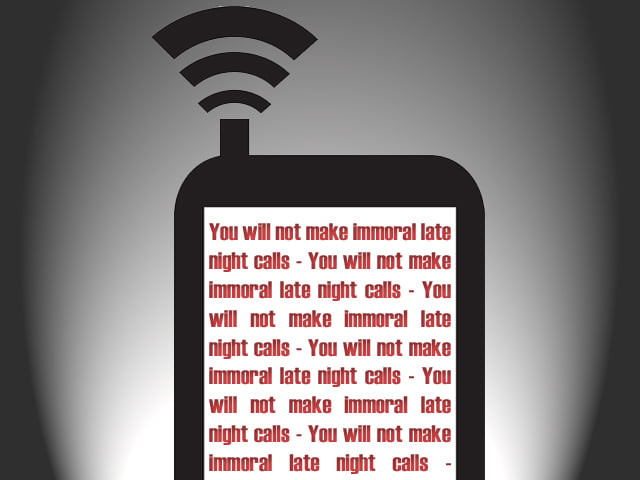Thin line between moral and immoral: Future of low-priced call packages vague
Operators argue on basis of freedom of choice, consumers on freedom of speech, government on morality.

The operators argue that late night talk time packages are a choice, which must be available to the customers. “We do not force them,” says official. DESIGN: JAHANZAIB HAQUE
Two months into the ban, the future of late night calling packages – that offer cheaper rates for post midnight calls or free calls against fixed nominal charges – is still uncertain. The cellular mobile operators (CMOs) do not seem to give up on the subject; the government, on the other hand, want to ensure they do not cross the line.
The government had implemented this ban, through the telecom sector’s regulatory body – the Pakistan Telecommunication Authority (PTA) – in November last year.
The PTA’s directive received both anger and applause from different segments of society. Consumer rights experts, as well as many consumers, believed it to be a threat to their freedom of speech while others thought this was a much needed intervention by the government because these packages violated social norms and promoted vulgarity among the youth.
The mobile operators in Pakistan had been offering extremely low priced, on-net hourly call packages for post midnight calls – which is in line with the global practices. With low traffic in off-peak hours, telecom sources said, cellular service providers have greater capacity to offer discounts on calls during night. These packages do not add to their operational costs but helps increase the revenue.
The operators argue that late night talk time packages are a choice, which must be available to the customers. “We do not force them,” an official said.
These packages are also used by students who discuss their papers through conference calls, a telecom source said. One operator said their traffic increased around Fajr prayer – sometime as early as four in the morning. There is a huge labour community that starts work early morning, he said.
Giving an example, he said, fruit and vegetable markets, masons, hawkers and milk suppliers start their day early morning.
PTA is the enforcing agency, the directive came from the government, a PTA official said. The regulator’s stance is impartial on this subject, he added.
The government decided to ban late night calling packages and chat room services on the complaints of different segments of society: parliamentarians, students, parents and social activists to name a few.
The PTA had banned all kinds of late night calling packages. However, it is the chat room service, which seems to have weakened the industry’s case.
“I do not believe in moral policing. People should have this choice of availing cheaper calls,” the Adviser to the Prime Minister IT and Telecom Basit Riaz Sheikh said. However, the chat room services raise a serious question on our cultural values.
Riaz said he had no problems with packages offering reduced calling rates to customers otherwise cautious about paying more for making calls. However, in chat room services, he said one can dial in a four digit code and get connected with random people mostly from the opposite sex. These chat rooms promote vulgarity, he said. It is even difficult for the mobile operators to back these packages on moral grounds.
When the government asked telecom operators to ban the night time calling packages, it referred to the chat room services mainly, Sheikh said. “There should be a clear distinction between these two types,” he added.
On the contrary to what the IT and telecom adviser said, PTA’s stance on the issue seems to be even more strict.
There should be separate guidelines for adults and children who use such packages, said a PTA official who wished anonymity. The telecom operators should adopt a system where subscriber’s age is identified, he said.
This is happening in the West, he said, where parents give permission to the operators for what websites their children can access through mobile internet.
Published in The Express Tribune, January 21st, 2013.
Like Business on Facebook to stay informed and join in the conversation.


















COMMENTS
Comments are moderated and generally will be posted if they are on-topic and not abusive.
For more information, please see our Comments FAQ